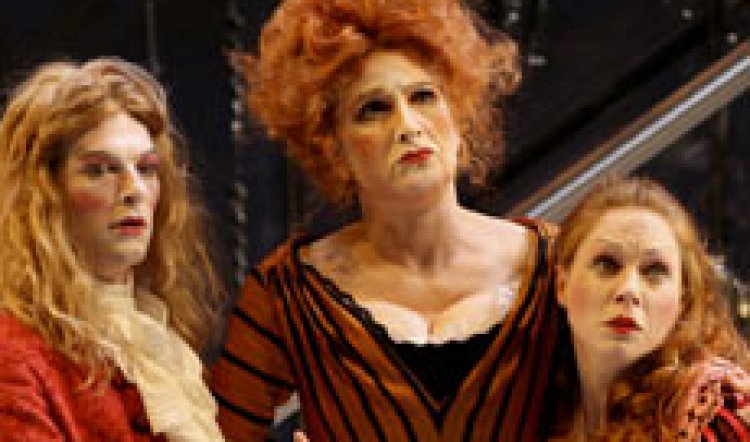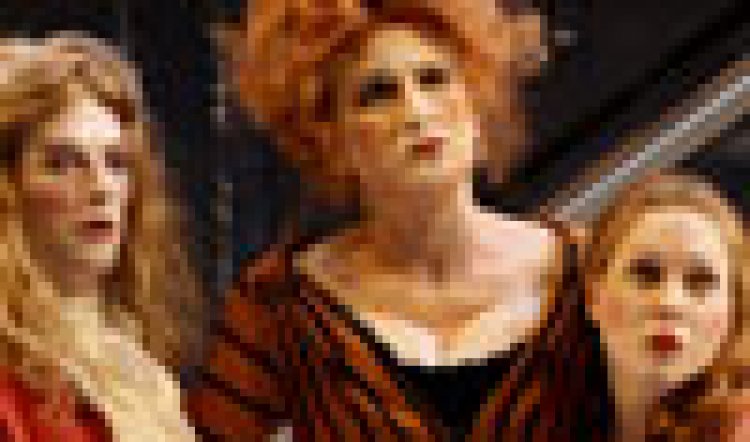
Wondering in Wonderland
The time has come, the Walrus said, to talk of many things: of shoes and ships and sealing wax and cabbages and kings. You will note the Walrus did not mention sacred cows - which maybe is why the STC's Actors' Company didn't get a guernsey in his list.
Sacred Cow is pretty much how the Actors Company has been treated in Sydney since its inception two years ago. There has been muttering at the back of the stalls and in quiet corners of the bar and Wharf theatre precincts, but outright discussion of Robyn Nevin's Dream, aka the Beast of Many Backs? Nope - unless you count the tentatively enthusiastic (when not simply puzzled) news features written when it was first announced.
Now is as good a time as any to break the spell - visiting English director Edward Dick's production of A Midsummer Night's Dream is over and there is just one more show for the group (Tales From the Vienna Woods) before its second marathon year in existence is over and - apparently - a bunch of fresh actors get the tap. And for what? What has been achieved? What more can be achieved? What was - is - the point?
In the beginning there was the word and it was: "It's Robyn's dream and Bob Carr is giving her the money to fulfil it." Having a company artistic director with dreams is a rare and wonderful thing, but the trouble with dreams is that reality demands so much more. Nevin's dream was to gather a handpicked group of actors and have them work together in a way that is not possible within the production-line conventions of modern/subsidised theatre: three weeks rehearsal, five or six performing weeks and then "Chookas, bye-bye til next time - here's hoping."
Nevin believed that being together, working together, getting to know and trust one another would be a great thing for actors; would achieve results on stage which might not otherwise be possible. Well, yes, and maybe all good. But again - what is the point?
Crucially, beyond the initial dream no Grand Plan has become evident so, in effect, the Actors Company has been little more than an (albeit extremely well paid and well resourced) rep company not dissimilar to the kind that died out in Britain around the middle of the 20th century. Although the repertory company is now viewed through the rosy specs of nostalgia, there were many reasons for its demise: economics, television, bingo - and boredom. Boredom!
[page]Boredom has arisen with Sydney's incarnation not necessarily because of play choice (more of that later), nor because the company actors are not - in the main - the crème de la crème, but because what started out as a glorious indulgence for a bunch of very lucky performers has turned into something much less for punters. Not least because there is even more crème left out in the cold, unable to get a gig because of this mob.
Even during the first season in 2006 variations on the following were overheard on a number of occasions in STC auditoria: "I love John Gaden and Pam Rabe is lovely, but I'm sick of them. I don't want to see them in every single show. I'm not renewing my subscription." And whether those disgruntled subscribers were the tip of the iceberg or not is impossible to know, but the STC did experience a drop in subscribers in 2007 - although, it has to be said, their numbers remain rudely healthy.
Underlying the discontent with yet another great - or not so great - performance from Rabe, Gaden, Carroll, Moody and co is something else. Like the rest of us, actors are creatures of habit and limitations. With rare exceptions - Meryl Streep and Cate Blanchett for instance - most actors do pretty much the same schtick over and over, no matter what the role, the play, the period or who the director might be. The Actors Company is no exception and - just as happens in any relationship - the cute and lovable little foibles we loved at the beginning, or occasionally, can turn into the things that drive us nuts when we experience them over and over and over with little respite.
Ironically - or perhaps that should be predictably - it's been the older, established actors whose habits and limitations have become most noticeable. Does this suggest they have gained least from the experience, or proved most resistant to change? Or maybe the nature of limitations is simply that: limits.
On the other hand, the younger, less experienced players - and the Macs: Hayley McElhinney, Amber McMahon in particular - have excelled and grown throughout. And actors hitherto unfamiliar to Sydney audiences - such as Dan Spielman - have also shone; while the pregnancy replacements - Emily Russell and Helen Thomson - have brought a zip and sparkle to an actorscape which has gradually been leached of both, despite the variously dramatic and satisfying landscapes of the individual plays.
In retrospect (a particularly useless tool) it was probably inevitable that all of this would come to pass - including the unrest and snarling lately heard coming from the Actors' Company den. Because despite the original dreams and fanfare, the fact is they've been sold a pup.

With the exception of working with Barrie Kosky to create the ambitious The Lost Echo, parts 1 & 2 in 2006 and, to a lesser extent, with visiting notables Anabel Arden and Stephen Jeffreys on The Art of War this year, the actors have been engaged in the utterly conventional, if slightly longer, grind of rehearsal and performing cycles. The only distinguishing feature of the plays in which they've appeared is ... A Large Cast. The only other distinguishing feature of the company has been: relentless work and no worry about where the next rent cheque is coming from. That in itself is a novelty for the majority of Australian actors, but may nevertheless pall after two years of relentless playmaking.
My own mental picture - when the company was first announced - was that the actors would be employed on path breaking, mould-breaking, mind-stretching, actor-growing experimental, thrilling, riskywork. That visionary directors and writers would be commissioned to devise a long-form program whose only bottom line would be: "Do something different; reach for the stars." That creativity would take precedence over box office; that failure would be countenanced - as long as it was an ambitious, exciting failure.
 Instead, what we have had is a handful of "classics" (aka big cast and costly to stage) which have been more or less well done such as The Bourgeois Gentleman, Season at Sarsaparilla, Mother Courage and, presumably Tales From the Vienna Woods; and most recent: the curiously blurred and almost incoherent version of A Midsummer Night's Dream which botched the comedy and turned it into a rather nasty sexpo instead.
Instead, what we have had is a handful of "classics" (aka big cast and costly to stage) which have been more or less well done such as The Bourgeois Gentleman, Season at Sarsaparilla, Mother Courage and, presumably Tales From the Vienna Woods; and most recent: the curiously blurred and almost incoherent version of A Midsummer Night's Dream which botched the comedy and turned it into a rather nasty sexpo instead.
Barrie Kosky can always be relied upon to do something provocative and exciting but I managed to miss Lost Echo 1&2, however, as I was out of the country for its short run, so what I know of it is based on: "It was fantastic", "it was typical Barrie, why doesn't he grow up", "the second half lost the plot" "it was the best thing I've seen in years" and some production stills.
[page] The only production that went anywhere near the experimental and new was the Arden/Jeffreys reading of Sun Tzu, The Art of War. And even that was - in the end - just another play and in its scope and reach not unlike Belvoir's staging of David Hare's Stuff Happens. That aside, The Art of War was also one part of a trilogy - and the other two parts either were or will be performed elsewhere by others! This seems bizarre and a pity - how much more interesting it might have been if, say, nine months' work had gone into devising and producing the trilogy in Sydney. The true ensemble work and a different kind of physical language which were glimpsed in the production may have ultimately turned into something really thrilling and altered the mindset of both actors and audiences.
The only production that went anywhere near the experimental and new was the Arden/Jeffreys reading of Sun Tzu, The Art of War. And even that was - in the end - just another play and in its scope and reach not unlike Belvoir's staging of David Hare's Stuff Happens. That aside, The Art of War was also one part of a trilogy - and the other two parts either were or will be performed elsewhere by others! This seems bizarre and a pity - how much more interesting it might have been if, say, nine months' work had gone into devising and producing the trilogy in Sydney. The true ensemble work and a different kind of physical language which were glimpsed in the production may have ultimately turned into something really thrilling and altered the mindset of both actors and audiences.
The Art of War and Lost Echo offer a pointer to what has been totally lacking in the Actors Company: an over-arching, questing creative imagination. What this idea needed to make it truly worthwhile were theatrical minds and ambitions such as are to be found (or were found) in the likes of Peter Brook, Pina Bausch, Ariane Mnouchkine, Nikolai Akimov, Darko Tresnjak, Craig Walker, Deborah Warner and Peter Sellars. This is a partial and personal list of creative minds and the sharp-eyed will have spotted no Australians names on it; no youthful names either. If you can add directors/creators whose names it is possible to link with a description of "visionary, experimental, questing" - please do.
Meanwhile, what has been achieved in two years of the Actors Company is surely not "courage", as identified by Edward Dick in his notes for The Dream - but he would say that wouldn't he? Rather, there is some disappointment and frustration - although none will say so publicly and who can blame them. (Audiences are not the only ones to be bored it seems.) And while actors are a generous and forgiving lot in the main, the Golden Few must feel the repressed resentment - even though the resenters are every bit as good at acting.
The Actors Company has funding through to 2009, which means incoming artistic directors Blanchett and Upton must have thought about what to do with the next generation. This could be its creative saving grace: it might actually become relevant and useful after all. And that's because Cate Blanchett is an exceptional talent and intelligence who will surely attract like minds. At the same time she is quite obviously secure in her talent and intelligence and therefore will surely welcome those minds, rather than see them as threats to be beaten back with a rolled up script of a forgotten classic.
We shall see. Until then ... will you walk a little faster, said the whiting to the snail, there's an actor close behind me - and she really wants a job.



